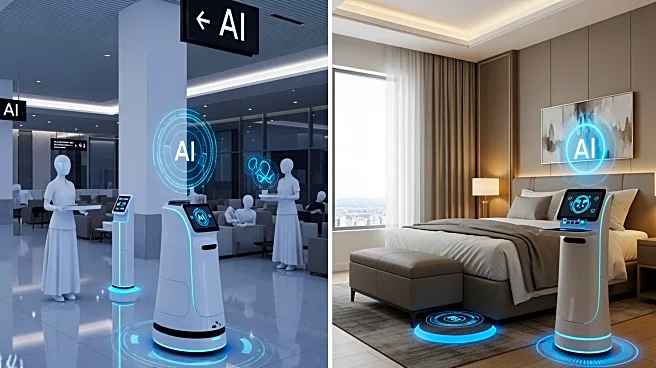What's Happening?
Airlines and hotel chains are heavily investing in artificial intelligence (AI) to modernize operations and improve efficiency. However, according to Amperity's 2025 State of AI for Hotels & Airlines report,
only a small fraction of this investment is reaching traveler-facing applications. While 96% of companies plan to maintain or increase AI spending, only 12% feel prepared to deploy it at scale, and just 35% are using AI in guest-facing experiences. The primary challenge is the poor integration of systems, which keeps AI confined to back-office operations. Companies like American Airlines are beginning to integrate AI into customer experiences, aiming to make travel planning more intuitive and personalized.
Why It's Important?
The limited application of AI in traveler-facing roles highlights a significant gap in the travel industry's ability to enhance customer experiences. This gap could affect customer loyalty and satisfaction, as AI has the potential to personalize and improve service delivery. The travel industry stands to gain significantly by overcoming integration challenges and using AI to enhance the emotional aspects of travel, such as booking and check-in experiences. Companies that successfully integrate AI into customer interactions could differentiate themselves in a competitive market, potentially increasing customer loyalty and operational efficiency.
What's Next?
The travel industry is expected to focus on improving data integration and system connectivity to fully leverage AI's potential. As companies like American Airlines continue to test and implement AI-driven tools, the industry may see a shift towards more personalized and intuitive customer experiences. The next 12 months could be pivotal in determining whether AI becomes a defining feature of the travel industry, with more brands integrating AI to deliver predictive and personalized offers.
Beyond the Headlines
The travel industry's struggle with AI integration reflects broader challenges in data management and system interoperability. The success of AI in travel may depend on cultural shifts within organizations, emphasizing the need for training and alignment across departments. Learning from sectors like retail, which have successfully integrated AI, could provide valuable insights for travel companies looking to enhance customer loyalty and lifetime value.









